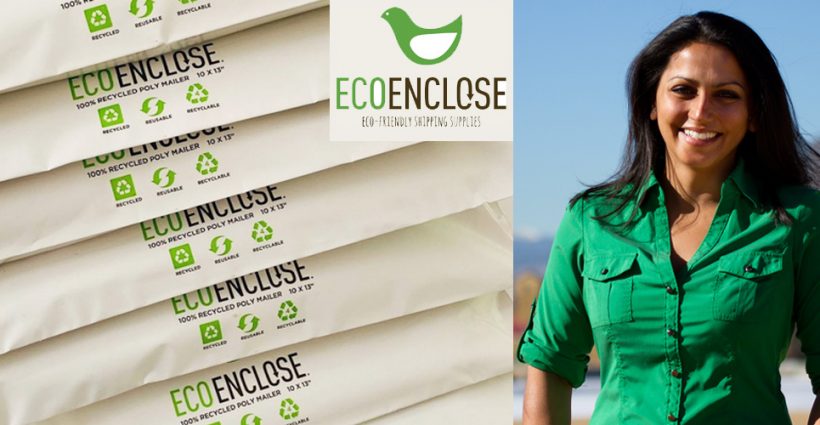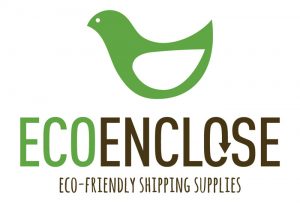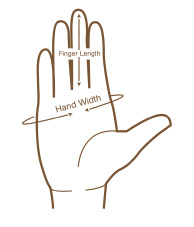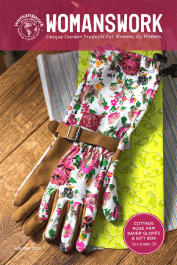designed for the way women work.

Do You Know What Your Ecommerce Carbon Footprint Is? Dorian Interviews Saloni Doshi CEO of EcoEnclose
Category: Presenting "The Curious Gardener", Strong Women Building A Gentle World
When ecommerce spiked during the pandemic, consumers started worrying about the packaging that products were being shipped in. Were there eco-friendly choices?
One company that designs for recyclability is EcoEnclose. Womanswork customers will recognize their green bird logo.
Recently I interviewed Saloni Doshi, a business leader who has been on the frontline of this issue for seven years. As CEO and co-owner with her husband of the Colorado-based packaging company, she’s deep into sustainability research and making sure their products are aligned with best practices.
When EcoEnclose reached out to Womanswork a few years ago their name alone piqued our interest. After hearing their pitch we switched over to their eco-friendly packaging for shipping orders from our fulfillment center in Massachusetts and our office in Pawling, NY. The added cost of using eco-friendly packaging was a trade-off we were, and still are, willing to make. (As volumes increase the cost differential lessens.)
Here are some of the things that Saloni told me when we spoke over the phone last week.
EcoEnclose is at the intersection of business and sustainability, she says. She understands that some choices may be driven by financial considerations and that businesses need to make it work for their bottom line.
She’s been at this intersection before. She used to work in sustainable agriculture, bringing her expertise from management consulting to a field in which she helped farmers learn how to convert from monocrops such as corn, which deplete nutrients from the soil, to regenerative agriculture. She supported the farmers to ensure this transition could have a positive ROI (Return on Investment).
“I see a future when all packaging can be made out of packaging.”
Her vision is clear. “We want a future of circularity – one in which all packaging can be made out of packaging. At the end of its useful life, packages should then be able to be recycled back into themselves,” says Saloni.
So how does a package recycle back into itself?
Circularity is one of the important concepts that helps explain this, and it’s something we practice at Womanswork, thanks to EcoEnclose. It starts with a polymailer that is made entirely out of recycled materials.
We send this mailer with our products to a customer and if they want to exchange the product, they use the same package to send it back to us. We then use the same package to send the exchange back to them. At the end of its useful life the consumer ideally recycles it through their municipal recycling program or at a grocery store drop off.
Why did we choose poly rather than paper mailers?
Paper and plastic are the two most ubiquitous materials in packaging.
Paper is easier to recycle, and because of this, many people often consider it the more sustainable option. But plastic actually has a lower carbon footprint. A poly mailer is a fraction of the weight of a similarly sized paper mailer, making it significantly more carbon efficient.
So having chosen eco-friendly polybags over paper—they are also more economical – we considered other options. What about compostable plastic mailers? I’d heard about them.
Saloni rejects currently available compostable plastic as a good solution. “When current bioplastic packaging composts, it does not result in good, high quality compost,” says Saloni. “You want to achieve humus in compost, and the current landscape of compostable bioplastic packaging simply does not lead to the type of quality soil you would want to apply to our lands,” she says.
In general, compostable plastic also does not biodegrade in a marine environment; meaning that this type of plastic is not a solution to the ocean plastic crisis. She sits on the Board of EcoCycle, Boulder’s waste management provider, and she knows of what she speaks.
Today’s compostable plastic mailers are also made from corn (PLA), the poster child for unsustainable agriculture.
She is, however, excited about some potential innovations in the bioplastic space, include converting seaweed or food waste into a bioplastic (not yet commercially available) and black algae ink (available at EcoEnclose).
Saloni doesn’t knock any competitors in the eco-friendly packaging space, who she says, “are all trying to make the world of ecommerce a better place just like we are.” But she did acknowledge that there are some sustainability myths out there that should be debunked.
Here are some myths to Debunk.
- Paper has a lower carbon footprint than plastic. Recycled poly mailers and poly bags have a significantly lower carbon footprint than paper alternatives. While there are trade offs to using poly bags, it is helpful to keep this in mind when weighing these two options.
- Compostable plastic is better than recyclable plastic. Compostable plastic does not make good compost and has not been proven to break down in marine settings.
- Downgauging film (into thinner plastic film) is always better because it uses less material. In fact, if plastic film is too lightweight, it becomes more likely to blow away and become litter.
- All virgin paper is the same. Some companies have a virgin paper strategy because virgin paper is stronger than recycled paper, and is available in white (recycled paper is hard to find in white). While she recommends that any brand using paper utilize recycled paper, she recognizes some brands do use virgin paper as part of their strategy. She cautions her customers to learn where any virgin paper they are using comes from. It should come from managed plantations, and not draw from ancient and endangered forests that are prevalent in Canada, Russia, the Amazon, parts of Africa and beyond.
What can the average consumer do? Look for labeling on the packages they receive to see if they are made from recycled materials. Is there any other labeling to indicate they are eco-friendly?
EcoEnclose trains its customer service staff to understand the trade-offs that their customers will have to work through. She also makes sure she hires people who care – about the planet and about the success of their customers. That’s obvious when you speak with them on the phone.
Saloni and I spoke for a few minutes about her garden. During the pandemic she says her vegetable garden was huge and thriving for two years. But last summer she and her husband and 3 young children decided to revive summer adventures – weekends away camping. With this shift, they focused less on the garden – opting for small, low maintenance plots of flower gardens instead.
This year she has been inspired by the Montessori school her kids attend. The elementary classroom established a pollinator garden at the school as part of a fall project, so she has built one at their home in Niwot, north of Boulder. “I look forward to the days I can invest time in a large vegetable garden again,” she says, “but for now, I’m loving the process of learning how to create something of ecological value with our land, that fits well in our lifestyle and commitments.”
We are inspired by Saloni Doshi’s story. “Strong Women Building A Gentle World.”


